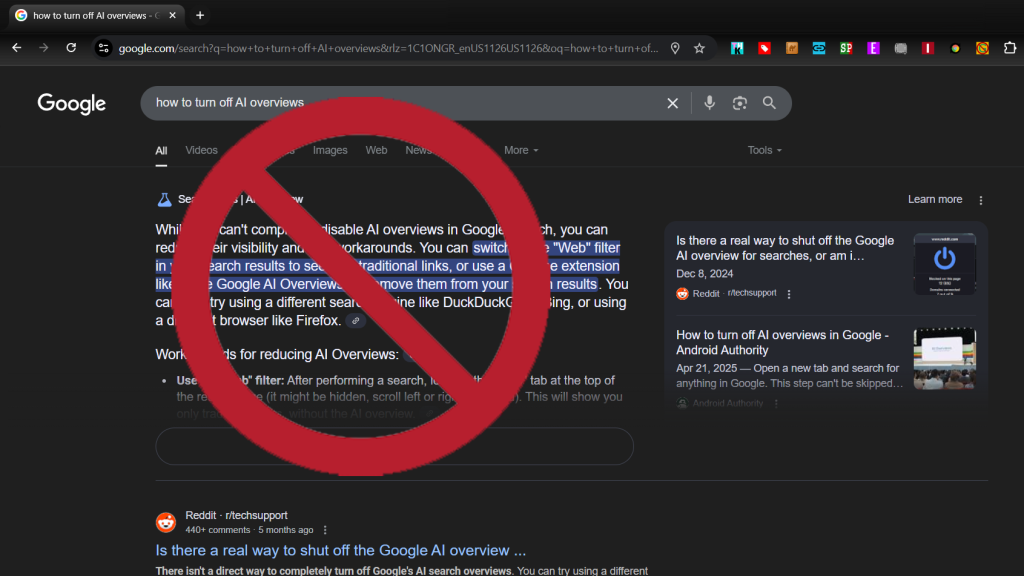The landscape of online searching is shifting dramatically, with Google, the dominant player in the field, driving significant changes through its incorporation of artificial intelligence (AI). This evolution, while ambitious, has raised concerns among users and content creators alike, with criticisms emerging regarding the accuracy and usefulness of the AI-driven features. As AI Overviews increasingly take precedence in search results, users are left grappling with a blended experience of information that feels both unreliable and intrusive.
The Rise of AI Overviews
Google’s recent rollout of AI Overviews above organic search results aims to streamline information access. While the intention may be to provide users with quick answers, the execution has been riddled with errors. A glaringly incorrect response was showcased when the AI mistakenly asserted, “No, today is not Friday. Today is Friday, May 30, 2025,” in response to the question “Is today Friday?” Such inaccuracies highlight a significant gap in reliability, raising questions about the effectiveness of AI as a knowledge source compared to traditional search results.
Google’s ambition seems to extend beyond minor tweaks; the company may soon aim to replace crucial parts of search with AI-fueled responses. This shift not only alters the search experience but also poses a threat to content creators whose works fuel Google’s algorithms. The search giant’s reliance on these creators for training materials appears paradoxical if Google intends to limit the visibility of their work for profit maximization. In a landscape where publishers once benefited from referral traffic, these new practices could lead to diminishing returns, creating a cycle that undermines both creators and the credibility of search results.
User Solutions and Tools
Understanding the frustrations tied to these changes, many users have sought alternatives to regain control over their search experiences. One notable solution is the browser extension “Bye, Bye Google AI.” Created by a frustrated user, this extension allows individuals to hide AI Overviews and other unwanted sections of Google’s search results. Since its release, it has garnered over 41,000 installations, evidencing a substantial demand for such customization. This tool not only enhances the user experience but also reflects a growing movement against the impersonalization of information retrieval.
As of the latest update, version 1.5 of “Bye, Bye Google AI” now supports 19 languages, making it more accessible to a global audience by allowing users to eliminate unwanted clutter from their search results. This includes the ability to hide the AI Mode tab, thus providing a more streamlined interface for those who prefer traditional search mechanisms.
Additional Workarounds
For users who prefer not to install extensions, there are other ways to circumvent AI Overviews. One simple method is to append “-noai” to search queries. While effective, this approach requires diligent practice to remember the added characters. An alternate, more seamless solution is to modify search parameters by adding “?UDM=14” to search strings, which directs users to the Google web tab, effectively filtering out AI-generated results.
- Open Chrome or Edge and navigate to chrome://settings/searchEngines.
- Add a new search engine with the following details:
- Name: Google (Web)
- Shortcut: google.com
- URL: {google:baseURL}/search?udm=14&q=%s
- Select “Make default” from the menu to ensure all searches utilize this setup.
For mobile users, specifically on Chrome for Android and iOS, the situation is trickier, as installing extensions is not an option. However, a site called tenbluelinks.org provides a way to register a custom search engine that incorporates the desired parameters into searches. This workaround allows mobile users to bypass the AI overlay seamlessly.
Implications for the Future of Search
The ongoing shifts in Google’s search paradigm reflect a broader trend towards AI integration in everyday technology. While AI can enhance efficiency, it also raises critical questions regarding the accuracy of information and the sustainability of content creation. Publishers are key stakeholders in the online ecosystem; without their contributions, the quality of AI training data would diminish, ultimately leading to poorer user experiences.
The future will likely see continued tension between AI implementations and user satisfaction, with the potential for user-driven solutions like browser extensions and modified search parameters playing a pivotal role in shaping interactions with search engines. As users continue to voice their concerns and seek alternatives, the tech giant may need to reassess its strategies, balancing innovation with respect for the foundational elements of the web.
Quick Reference Table
| Method | Description |
|---|---|
| Bye, Bye Google AI Extension | Hides AI Overview and other sections from search results. |
| -noai | Append this to search queries to avoid AI results. |
| ?UDM=14 | Add this to searches to view Google’s web tab without AI. |
| Ten Blue Links | A site that adds a custom search engine for mobile. |
| 41,000+ Users | Extensions users highlight the demand for customizable searches. |
| 19 Supported Languages | The extension now caters to numerous international users. |

